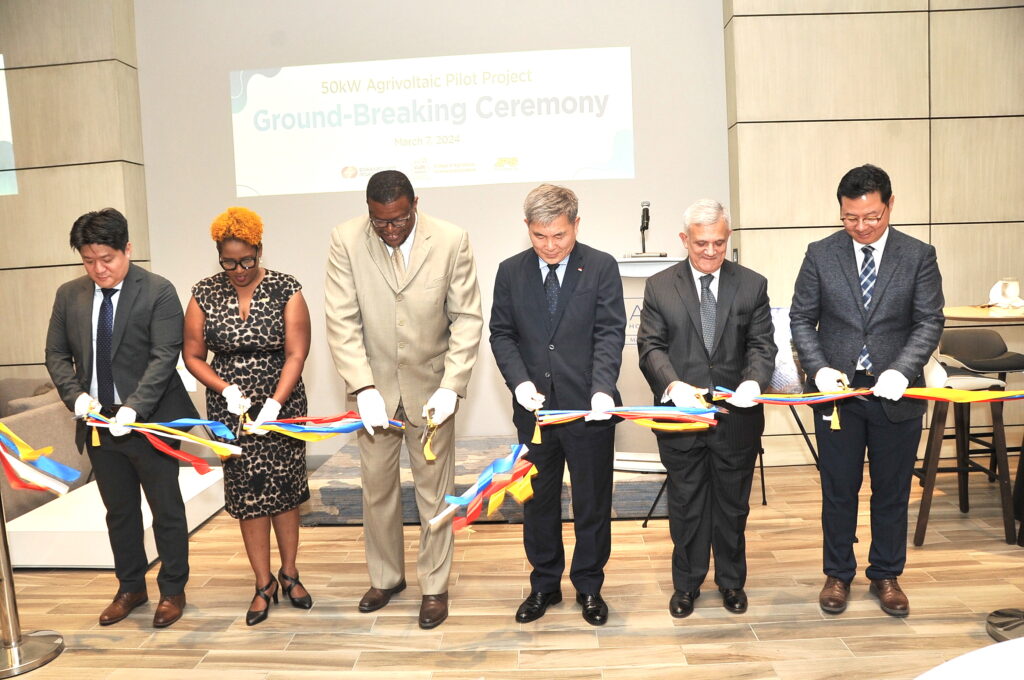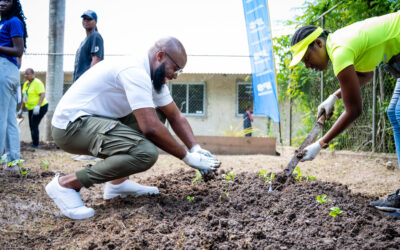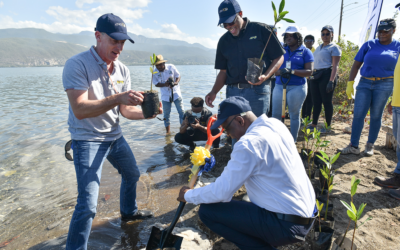
(l-r) Director Seung Yeun Han of project developer Envelops; Sophia Lewis, Head of JPS Foundation; Dr. Derrick Deslandes, President of CASE; Young Chan Lee, Executive Vice President of Korea EWP; Damian Obiglio, JPS Foundation Chairman; Michael Song, Managing Director of Korea EWP and JPS Board Director, participate in the ribbon cutting and ground-breaking ceremony for the 50 kilowatt Agrivoltaic Farm.
Jamaica’s first ever Agrivoltaic Farm was officially launched, at a recent symbolic ground breaking event at the AC Marriott Hotel in New Kingston.
Agrivoltaic farms maximize the use of land by engaging in crop cultivation and solar energy production simultaneously. The solar panels are placed above the crops being raised, while ensuring that the plants are able to receive adequate sunlight. Agrivoltaic farms are now a new emerging global trend.
This local path-breaking project, is a significant milestone in moving Jamaica ahead, in terms of renewable energy production, environmental stewardship and food security through agricultural innovation. The project is a collaboration among East West Power (EWP) Korea – one of two major shareholders in JPS, the JPS Foundation and the Portland-based College of Agriculture, Science and Education (CASE).
The project will be implemented in five phases over the next 24 months – from March 2024 to February 2026.
“The agrivoltaic farm, which can revitalize the rural economy and expand eco-friendly energy, is a project of interest to the current EWP’s President Kim Young Mun,” Young Chan Lee, Vice President of EWP said at the launch event. He informed that EWP has successfully completed a pilot project of 700kilowatts at seven locations in Korea.
Lee, outlining the scope of the project, said that the 50kWp agrivoltaic farm will contribute to climate change reduction by lowering carbon emissions from fossil fuel replacement. “This project will also be critical in addressing and reducing environmental problems such as smoke, noise, and fuel spills due to existing diesel power generation.”
The agrivoltaic farm aims to have a multipronged impact – from providing renewable energy for the CASE campus, as well as agricultural products; securing specific agrivoltaics technology and business models in the Caribbean; contributing tangibly to climate change reduction by lowering carbon emissions from fossil fuel replacement; mitigating environmental problems related to diesel power generation and increasing renewable energy assessment.
Director, of Envelops, developer of the Agrivoltaic Farm, Seung Yeun Han, in his presentation of the pilot project, informed that the agrivoltaic application will “strengthen the technical capacity for training students in renewable energy operations and climate change agriculture.”
The stakeholders are upbeat on the prospects, significance and the benefits which the agrivoltaic farm will bring to Jamaica. Envelops, Han pointed out, is also introducing the project in Fiji and Vietnam. In Fiji, on the island of Ovalau, it will be the first Korean development project approved by the Green Climate Fund. The project is expected to replace an impressive 50% of that island’s electricity demand with solar power.
Among those present at the launch were Chairman of CASE, Dr. Franklin Aundre and CASE President Dr. Derrick Deslandes.
“The launch of Jamaica’s first Agrivoltaic Farm represents a significant step forward in our efforts to foster sustainable development and combat climate change,” Dr Aundre said.
Dr. Deslandes, in endorsing the project, noted that: “By harnessing the power of the sun to produce both clean energy and nutritious crops, we are paving the way for a more resilient and prosperous future, not only for CASE but for Jamaica.”
In addition to its environmental and economic advantages, the agrivoltaic farm is expected to create new job opportunities, stimulate rural development, and diversify local agricultural production







